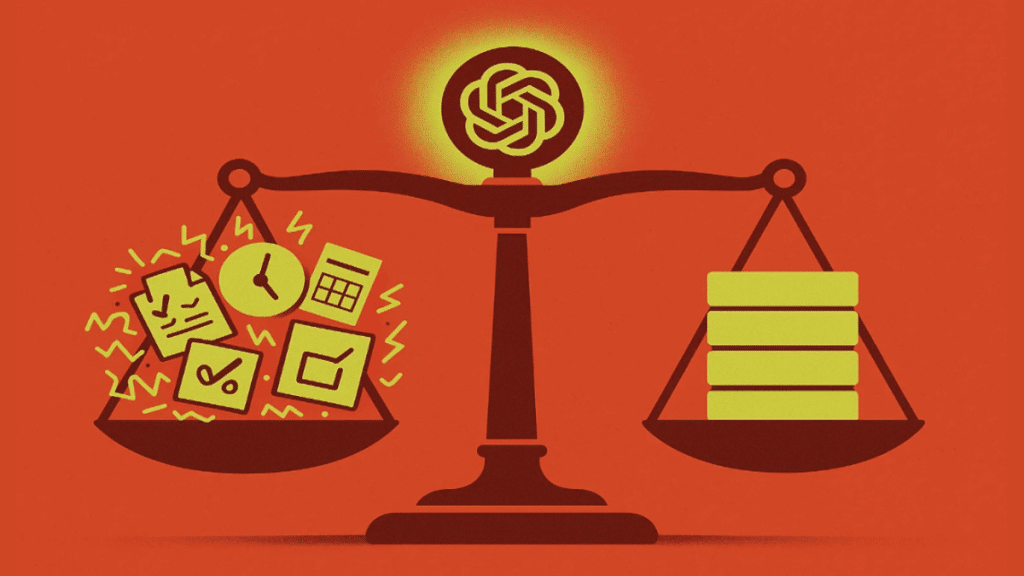When Deadlines Stopped Owning the Week
ChatGPT wasn’t supposed to fix his procrastination. The developer-turned-marketer already had every cloud-based tool stacked: Kanban boards, reminders, even a Perplexity AI plugin for task tracking. Yet deadlines kept slipping. He coded at midnight, sent proposals late, and lived in constant catch-up mode.
The first time he asked ChatGPT to rewrite his week as a structured schedule, it did what no software had done before. Tasks shrank into focus blocks, deadlines balanced out, and procrastination finally lost its grip.
The Developer Who Couldn’t Start on Time
He wasn’t lazy. He overthought everything.
- Should I answer Slack first?
- Do I code now or later?
- Is this email urgent or can it wait?
By the time decisions were made, half the day was gone. Deadlines piled up until the only solution was working late nights.
One Sunday evening, tired of pushing tasks forward, he asked ChatGPT:
“Restructure my week so I hit deadlines without working late. Add focus, balance, and buffer hours.”
ChatGPT Rebuilt His Week Into Sprints
The reply wasn’t motivational fluff. It was a 5-day sprint plan:
- Mornings: deep work, two-hour blocks before any messages.
- Midday: admin, client calls, quick wins.
- Afternoons: project work, revisions, follow-ups.
- Friday: backlog cleanup, planning the next week.
Even more, ChatGPT flagged where he usually procrastinated (email, endless prep) and moved them into controlled time slots.
For the first time, deadlines didn’t stack. They spread evenly.
How GPT Kept Him Accountable Daily
He made it a ritual. Every night before logging off, he ran:
“Balance tomorrow’s tasks against deadlines. Limit to 6 items. Place deep work first, distractions last.”
The next morning, he woke up to a crisp plan. No guessing. No overthinking. Just execution.
After two weeks, numbers told the truth:
- Deadlines hit 90% on time (up from 50%).
- Procrastination blocks dropped by half.
- He gained 10+ hours of evening free time.
Why ChatGPT Worked Better Than His Old Stack
Before, tools created clutter. Asana, Notion, Google Sheets—each gave reminders, not clarity.
ChatGPT gave sequence.
| Tool | What It Did | Why It Failed |
| Asana | Tasks lists | Too many, no order |
| Notion | Project docs | Heavy, not daily |
| Perplexity AI | Data checks | Not task-focused |
| ChatGPT | Balanced routines | Simple, executable |
The real win wasn’t new tools. It was reordering priorities automatically.
Chatronix: The Cockpit That Locked It In
From scattered prompts to one workflow
He still needed Claude for polished emails, Gemini for market research, and Perplexity AI for validating tasks. But juggling tabs recreated old chaos.
That’s when he tried Chatronix AI platform.
Chatronix gave him:
- Six models in one chat: GPT-5, ChatGPT, Claude, Gemini, Grok, Perplexity AI.
- 10 free queries to test balanced routines.
- Turbo mode with One Perfect Answer, merging outputs into one clean plan.
- Prompt stacks so his “deadline balancer” was one click away.
- Side-by-side comparisons to see which model produced the sharpest prioritization.
| Workflow Step | Old Way | With Chatronix |
| Daily planning | Sticky notes + apps | Turbo mode digest |
| Client emails | Manual edits | Claude polish |
| Research tasks | Manual Google dive | Gemini scan |
| Deadline balance | Stress-driven | Saved prompt stack |
For the first time, balance wasn’t a wish—it was structured.
Bonus Prompt That Beat Procrastination
Every Monday morning, he ran this inside Chatronix Turbo:
“Restructure this week into a balanced 5-day sprint. Spread deadlines evenly, assign focus windows, block evenings, and flag any risky tasks.”
The merged output became his week’s blueprint. By Friday, there were no spillovers.
What Changed Beyond Work
The measurable wins:
- Projects delivered on time for the first quarter in years.
- Stress dropped—he stopped working past 9 p.m.
- Procrastination shrank into short, scheduled breaks.
The invisible win? He stopped fearing Mondays.
Why This Story Matters
Procrastination doesn’t come from laziness. It comes from chaos. ChatGPT reorganized chaos into balanced days. Chatronix made the system sustainable by blending six models into one cockpit.
The result wasn’t just better deadlines. It was control.
Final Thought
He didn’t delete Slack. He didn’t buy another productivity app.
He just let ChatGPT balance his week.
He let Chatronix keep it consistent.
And once procrastination lost, evenings stopped belonging to work.
Because sometimes the real productivity hack isn’t discipline—it’s design.
